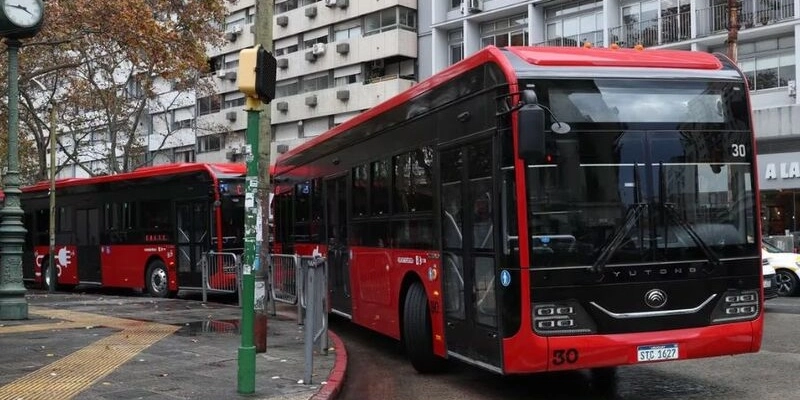With the arrival of a new Chinese brand to the electric bus market in Uruguay, there are now three main Asian players that dominate this sector: BYD, Higer and Yutong.
At the beginning of June, urban public transport companies presented their new 100 per cent electric buses.
There are 20 units of the Yutong brand, distributed as follows: six for Unión Cooperativa Obrera del Transporte (UCOT), nine for Employees of Collective Transport (COETC) and five for Corporación de Ómnibus Micro Este SA (COMESA).
Furthermore, according to Luis Pablo Inthamoussu, Director of Mobility at the Municipality of Montevideo, in conversation with Mobility Portal Latinoamérica: “There are going to be 21 new electric buses because one more is arriving.”
The incorporation of new eBuses, with batteries with a storage capacity of 385 kilowatts (kW), ensures autonomy of around 300 kilometers (km) of travel.
In addition, the new electrical units have the capacity to be incorporated into all current lines.

With this addition, the total number of electric buses in the Uruguayan capital would reach 52 zero-emission vehicles.
However, the year still holds more news in terms of incorporations.
In this second half, another 90 additional electric units from the BYD and Higer brands are expected.
“These new buses will be managed by CUTCSA, the majority operator,” confirms Inthamoussu.
This investment will allow electric buses to reach 10 per cent of the total fleet by the second half of the year, meeting the goals announced at the beginning of the year after the success of the trust destined to replace the fleet.
It is estimated that by the end of this year, the electric fleet will quadruple.
How does the trust for buses work?
CUTCSA received 25 of the 40 million dollars allocated by the Trust, being the largest operator in the market.
The rest of the money is distributed among the three remaining actors: UCOT, COETC and COMESA.
It is worth remembering that this Trust has been issued six times and is a financial tool that emerged in the early years of 2000.
At that time, a tax was established on the income of transportation companies, giving up the future flow of funds in exchange for a current value.
The Municipality of Montevideo is the administrator of the Trust funds and acts as guarantor.
For their part, the transportation companies assume the debt to buy the buses and machines under the standards imposed by the Municipality.
This fund makes it possible to renew diesel buses for electric ones, as well as finance the complete replacement of the collection system.
This includes the electronic vending machines installed in the fleets, responsible for validating trips with the STM card.
Furthermore, at the national level, there is an economic tool that transforms the subsidy received by transport operators to face the increase in fuel costs, thus favoring electromobility.
BYD leads public transportation in Montevideo
Public passenger transportation, made up of 1,500 bus units, is mostly under the operation of CUTCSA.
This position in the field of electric mobility has led CUTCSA to bet heavily on zero-emission transportation, choosing the BYD brand to begin its electrification process.
Currently, all CUTCSA electrical units in Montevideo are of this brand.
The company began its foray into electric mobility in 2016 by leasing a bus as part of a regional research project.
Three years later, in 2019, they acquired 20 BYD units for their fleet in Montevideo, and since the end of 2021 they have committed to not buying more diesel buses.
CUCTSA’s schedule contemplates renewing 25 per cent of its fleet by 2025 (between 250 and 280 buses), another 25 per cent for 2030, an additional 25 per cent in 2035, with the objective of reaching 100 per cent of its electric fleet by 2040.





